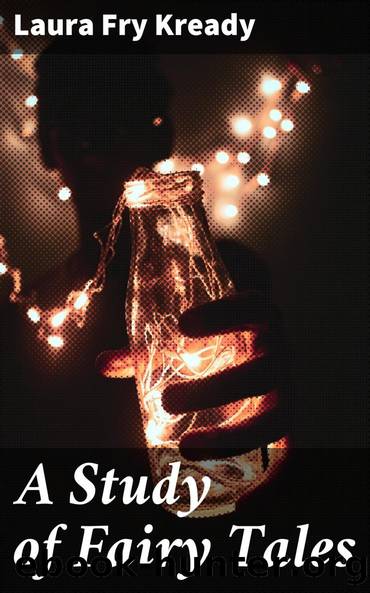A Study of Fairy Tales by Laura Fry Kready

Author:Laura Fry Kready [Kready, Laura Fry]
Language: eng
Format: epub
ISBN: 9781372008283
Google: O01fvgAACAAJ
Publisher: Creative Media Partners, LLC
Published: 2016-08-28T00:52:02+00:00
I. THE ORIGIN OF FAIRY TALES
Now that we have indicated the worth of fairy tales, have observed those principles which should guide the teacher in choosing and in interpreting a tale, and have stated those rules which should govern the story-teller in the telling of the tale, we may well ask a few further questions concerning the nature of these fairy tales. What is a fairy tale and whence did it come, and how are we to find its beginning? Having found it, how are we to follow it down through the ages? How shall it be classed, what are the available types which seek to include it and show its nature? And lastly, what are the books which are to be the main practical sources of fairy tales for the teacher of little children? The remaining pages attempt to give some help to the teacher who wishes to increase her resources with an intelligent knowledge of the material she is handling.
Many times the question, "What is a fairy tale?" has been asked. One has said: "The fairy tale is a poetic presentation of a spiritual truth." George MacDonald has answered: "Undine is a fairy tale." Mr. G.K. Chesterton has said: "A fairy tale is a tale told in a morbid age to the only remaining sane person, a child. A legend is a fairy tale told to men when men were sane." Some, scorning to reply, have treated the question as one similar to, "What poem do you consider best in the English language?" As there are many tales included here which do not contain a fairy, fairy tales here are taken to include tales which contain something fairy or extraordinary, the magic or the marvelousâfairies, elves, or trolls, speaking animals, trees, or a talkative Tin Soldier. The Myth proper and the Fable are both excluded here, while the pourquois tale, a myth development, and the Beast tale, a short-story fable development, are both included.
The origin of the word "fairy," as given by Thomas Keightley in his Fairy Mythology, and later in the Appendix of his Tales and Popular Fictions, is the Latin fatum, "to enchant." The word was derived directly from the French form of the root. The various forms of the root were:â
Latin fatum, "to enchant."
French fee, feerie, "illusion."
Italian fata.
Provençal fada.
Download
This site does not store any files on its server. We only index and link to content provided by other sites. Please contact the content providers to delete copyright contents if any and email us, we'll remove relevant links or contents immediately.
The Evolution of an Empire: A Brief Historical Sketch of France by Mary Platt Parmele(429)
An Introduction to the Philosophy of Law by Unknown(330)
Astounding Stories, August, 1931 by Various Authors(326)
B-12's Moon Glow by Charles A. Stearns(322)
Historia Amoris by Edgar Saltus(315)
Arsene Lupin vs. Herlock Sholmes by Maurice Leblanc(310)
BY Arthur H. Smith, Smith A.H. by Village life in china(306)
The Fade Tabletop by Jeremy Harris(300)
The Scottish Fairy Book by Elizabeth W. (Elizabeth Wilson) Grierson(284)
The story of Sigurd the Volsung and the fall of the Niblungs by William Morris by Unknown(283)
The Courtship of Morrice Buckler by A. E. W. Mason(271)
The moral and intellectual diversity of races, with particular reference to their respective influence in the civil and political history of mankind from the French by Count A. De by Gobineau Arthur comte de(259)
Cozy Up for Christmas by Jenny Holiday(255)
Memoirs of a Veteran: Personal Incidents, Experiences and Observations by Isaac Hermann(248)
Cottage Economy, to Which is Added The Poor Man's Friend by William Cobbett(243)
Euthenics, the science of controllable environment by Ellen H. (Ellen Henrietta) Richards(242)
A History of Witchcraft in England from 1558 to 1718 by Wallace Notestein(242)
The Black Douglas by S. R. Crockett(241)
Folk-Tales of the Khasis by Mrs. Rafy(241)
